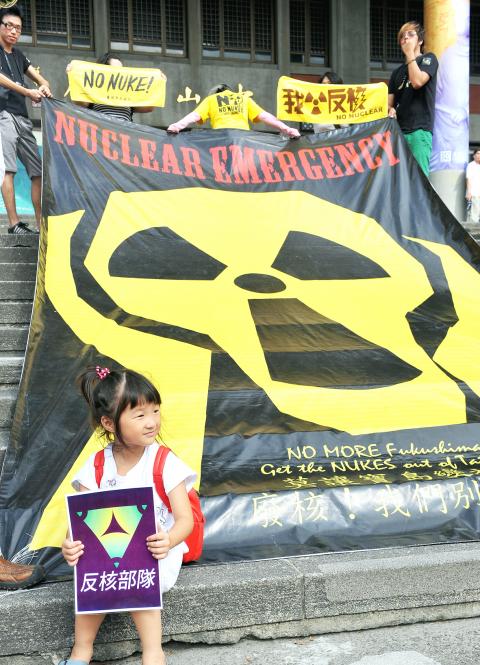Anti-nuclear groups said they doubted there was a workable plan in place to evacuate 6 million people within the 30km evacuation zones of the first and second nuclear power plants, calling the government’s safety claims as absurd as an emergency exit-deprived Taipei 101 guaranteeing the safety of visitors.
Nuclear safety is not restricted to the nuclear engineering techniques within the plants, said Japan and Taiwan Exchange Association spokesman Chen Hong-mei (陳弘美), who organized a panel discussion about nuclear safety held yesterday called “No Nukes for Earthquake Countries.”
Three Japanese anti-nuclear advocates were on the panel, one of whom was Idogawa Katsutaka, the mayor of Futaba city, which is close to the Fukushima Dai-ichi Nuclear Power Station.

Photo: Chien Jung-fong, Taipei Times
Chen said that a Japanese research group, the Association for the Research of Transportation Problems and Human Rights, published a report in January on the evacuation time needed for people living within the 30km exclusion zones of the nuclear power plants in Japan.
The report said that the region that would require the most time to evacuate was one that has 750,000 residents, requiring at least 142 hours (six days) for full evacuation.
Chen said that there are 6 million people living within the 30km evacuation zone around Taiwan’s Jinshan (金山) and Kuosheng (國聖) nuclear power plants.
Murakami Tatsuya, then-mayor of Tokaimura village during the Tokaimura Criticality Accident in 1999, oversaw the evacuation of 310,000 residents living within a 10km radius of the Tokaimura nuclear power plant. He called a plan to evacuate the 1 million people within the 30km evacuation zone of Tokaimura plant “impossible.”
Idogawa, who was exposed to a high level of radiation while trying to get people out of the town, said that he was deceived.
“Nuclear power plants cannot continue operations without relying on lies,” he said, adding that before the Fukushima accident, Tokyo Electric Power Co and the Japanese government had repeatedly assured him that accidents would not happen.
He was told by a Swedish nuclear power expert that it would take 500 years before Futaba residents could return to their homes.
Taipei mayoral aspirants Ko Wen-je (柯文哲) and Wellington Koo (顧立雄) were among the participants at the discussion.
Koo said that as the chairman of the Taiwan Association for Human Rights, which has always been anti-nuclear, he has taken a firm stance against nuclear power.
“After the tragedy at Fukushima, the problem of nuclear power has become palpable. It is no longer an issue about generational justice, but about our right to existence,” he said.
It has been reported that out of 34 nuclear reactors operating in earthquake-prone regions around the world, 30 are in Japan and Taiwan.
“All eight reactors in Taiwan are on the list,” Koo said, calling the government’s “no Fourth Nuclear Power Plant without nuclear safety” guarantee upheld by KMT Mayor hopeful Sean Lien (連勝文) “an empty promise.”
Ko panned the Ma administration as a “green-card government” with officials being able to flee the nation if a catastrophe occurs.
“The question of what to do with nuclear power plants is extremely simple when we take future generations into consideration. Only those who plan their future in four-year units would agree to the building of the plant,” he said.

An essay competition jointly organized by a local writing society and a publisher affiliated with the Chinese Communist Party (CCP) might have contravened the Act Governing Relations Between the People of the Taiwan Area and the Mainland Area (臺灣地區與大陸地區人民關係條例), the Mainland Affairs Council (MAC) said on Thursday. “In this case, the partner organization is clearly an agency under the CCP’s Fujian Provincial Committee,” MAC Deputy Minister and spokesperson Liang Wen-chieh (梁文傑) said at a news briefing in Taipei. “It also involves bringing Taiwanese students to China with all-expenses-paid arrangements to attend award ceremonies and camps,” Liang said. Those two “characteristics” are typically sufficient

A magnitude 5.9 earthquake that struck about 33km off the coast of Hualien City was the "main shock" in a series of quakes in the area, with aftershocks expected over the next three days, the Central Weather Administration (CWA) said yesterday. Prior to the magnitude 5.9 quake shaking most of Taiwan at 6:53pm yesterday, six other earthquakes stronger than a magnitude of 4, starting with a magnitude 5.5 quake at 6:09pm, occurred in the area. CWA Seismological Center Director Wu Chien-fu (吳健富) confirmed that the quakes were all part of the same series and that the magnitude 5.5 temblor was

The brilliant blue waters, thick foliage and bucolic atmosphere on this seemingly idyllic archipelago deep in the Pacific Ocean belie the key role it now plays in a titanic geopolitical struggle. Palau is again on the front line as China, and the US and its allies prepare their forces in an intensifying contest for control over the Asia-Pacific region. The democratic nation of just 17,000 people hosts US-controlled airstrips and soon-to-be-completed radar installations that the US military describes as “critical” to monitoring vast swathes of water and airspace. It is also a key piece of the second island chain, a string of

The Central Weather Administration has issued a heat alert for southeastern Taiwan, warning of temperatures as high as 36°C today, while alerting some coastal areas of strong winds later in the day. Kaohsiung’s Neimen District (內門) and Pingtung County’s Neipu Township (內埔) are under an orange heat alert, which warns of temperatures as high as 36°C for three consecutive days, the CWA said, citing southwest winds. The heat would also extend to Tainan’s Nansi (楠西) and Yujing (玉井) districts, as well as Pingtung’s Gaoshu (高樹), Yanpu (鹽埔) and Majia (瑪家) townships, it said, forecasting highs of up to 36°C in those areas